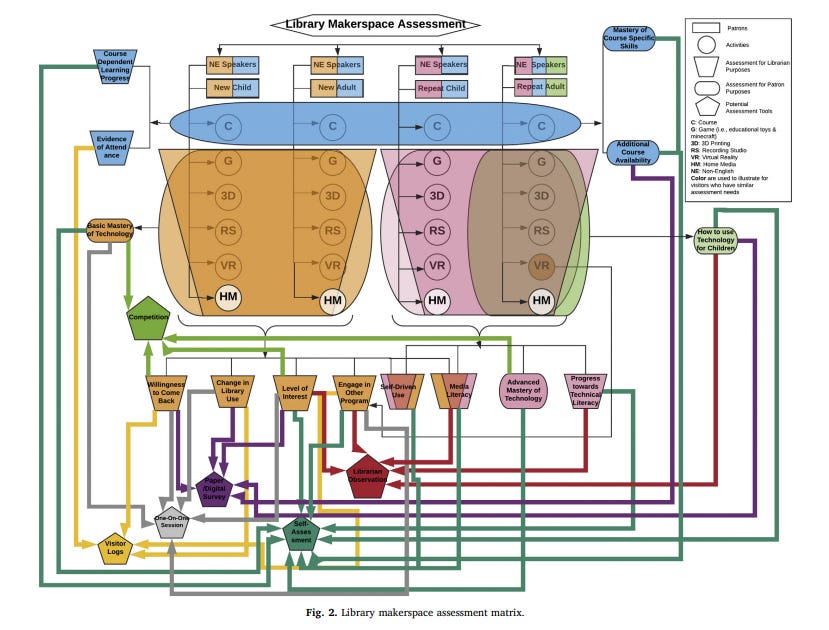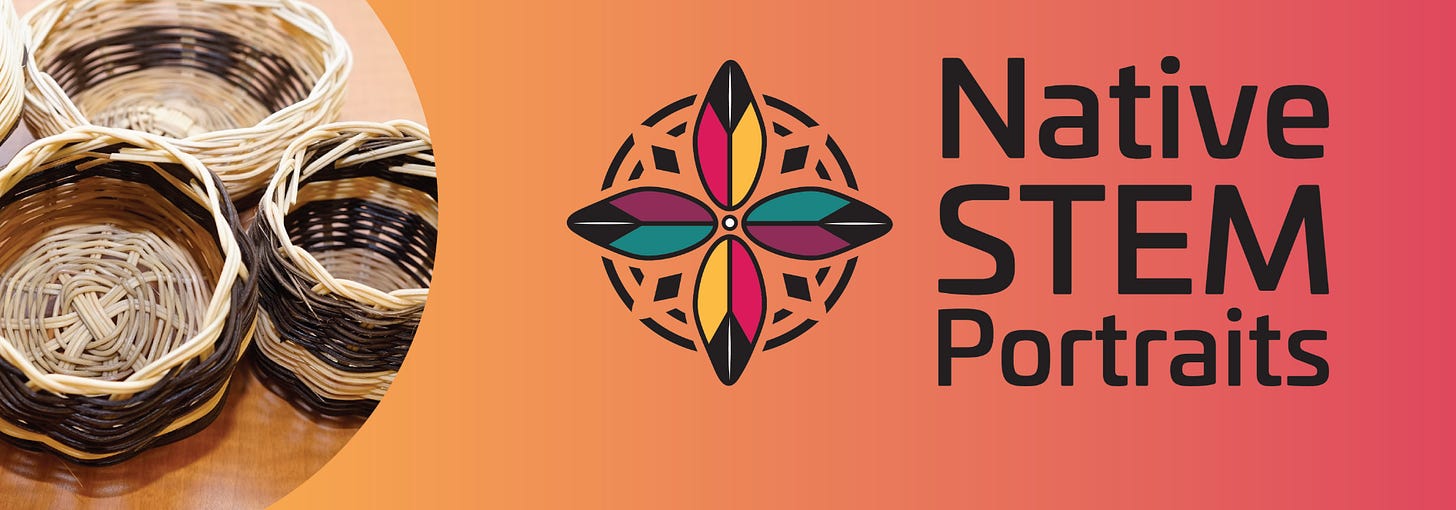Evaluating Fab Labs and Makerspaces
Welcome to Insights & Opportunities: A Hub for Informal STEM Education! Insights & Opportunities is a twice-monthly newsletter for educators, administrators, legislators, and advocates who recognize the importance of informal STEM learning.
This newsletter is brought to you by me, Sarah Dunifon, and my team at Improved Insights. I’m a long-time STEM educator, researcher, and equity advocate. Along with my team, I now work on cutting-edge informal STEM learning research and evaluation.
Each edition of this newsletter offers exciting insights, resources, and opportunities for informal STEM learning professionals, including funding, jobs, professional development, informal STEM learning research, evaluation tips and resources, and so much more! We hope you find it valuable. Now, let’s get started.
Evaluating Fab Labs and Makerspaces
Makerspaces and fab labs are crucial parts of the informal STEM learning ecosystem. Though different in their origin, both offer accessible spaces for people to create with access to tools, education, technology, and digital fabrication.
Evaluation of makerspaces and fab labs, like anything else, must be tied to your goals. Typically, when defining a focus for an evaluation, we rely on what are called “evaluative criteria.” These are elements of focus that inform the development of evaluation questions. One way to identify evaluative criteria is to think about what success looks like for your program.
To help identify which evaluative criteria to focus your evaluation on, it may be useful to reference this assessment matrix, created by Cun et al., (2019) that outlines possible evaluative criteria (e.g., attendance, learning progress, interest, and mastery of skills), among multiple participant types and activities, in a public library makerspace. This visual framework communicates the complexity of identifying evaluative criteria in makerspaces and fab labs as well as in other informal learning contexts.
To read the full article, check it out in our Insights.
60-Second Suggestions
Here are a few of my favorite things this month, usually pertaining to informal STEM education and evaluation, but occasionally some fun personal stuff, too.
In light of the devastating loss of the Reimagining Equity and Values in Informal STEM Education (REVISE) Center and informalscience.org, the Building Informal Science Education (BISE) project team (including Kevin Crowley, Karen Knutson, Kristen Ellenbogen, Amy Grack Nelson, Sarah Cohn, and Zdanna King) have made available their repository of nearly 500 informal STEM education evaluation reports. We hope that the REVISE Center is restored soon, but in the meantime we are grateful to those who have made the effort to preserve this important work. If you are looking for other REVISE resources, you can still access portions of informalscience.org on the archived page.
The Native STEM Portraits website highlights the journeys of Native students and professionals in STEM. Through participant-generated photographs, captions, and interview quotes, the site shares the supports and barriers experienced by Native undergraduates, graduate students, and professionals in STEM.
This recent blog post by Anthony Clairmont canvassed the general understanding of evaluation budgeting. Clairmont critiques the typical evaluation RFP system and offers alternative models for nonprofits and foundations to consider. We found his exploration of conventional evaluation budgeting wisdom to be enlightening and thought-provoking.
Opportunities
Check out these new opportunities for the informal STEM learning community.
Funding:
2025 Moonshot Grants, Remake Learning, up to $50,000. Nonprofits, schools, and universities are invited to apply for funding in four priority areas: catalyzing new efforts, prioritizing boldness, incorporating collaboration, and promoting equitable opportunities. Applicants are invited to envision a preferred future of learning and imagine what small steps they could take today toward that future. Submissions are due March 31, 2025.
Advancing Innovative Math Solutions (AIMS) EduData Initiative, Digital Promise (Funded by the Gates Foundation), variable ($10,000-$250,000). Graduate students, early career professionals, educators with research roles, and researchers serving minority institutions are invited to apply to join the AIMS Initiative. The Initiative is open to all types of research questions and methods (including exploratory projects, correlational research, measurement, and evaluation studies) provided they are aimed at building sustainable and scalable research infrastructure to advance math learning. Applications are due March 31, 2025.
Capacity Building Grants, Ewing Marion Kauffman Foundation, $100,000-$250,000. Nonprofits are invited to apply for capacity building grants aimed at strengthening organizational capacity through fostering sound leadership, strong boards, professional development for staff, technology, evaluation, strategic planning, communications, and sustainability. Grants support an organization's internal effectiveness and long-term stability. Applications are due April 4, 2025.
Spatial Thinking: Inspiring Action through Place-Based Solutions, The National Geographic Society, variable (Level I max of $20,000, Level II max of $100,000). Applicants over the age of 18 are invited to submit proposals for funding to support projects that identify place-based challenges and leverage educational solutions using spatial thinking to enable action. Two levels of funding (Level I and Level II) are accepting applications related to the focus areas of Ocean, Land, Wildlife, Human Histories and Cultures, Planetary Health, and Space. An informational webinar will be held March 27, 2025, at 9:00 AM ET, and pre-applications are due May 5, 2025.
UWorld Cares Community Grants, UWorld, variable. Nonprofit organizations in the Dallas-Ft. Worth metroplex (Collin, Dallas, Denton, Tarrant counties) are invited to apply for funding. Grants will be directed toward innovative programs that support middle and high school students, with a special emphasis on STEM. Applications are due March 31, 2025.
Youth Service Improvement Grants, William T. Grant Foundation, $25,000. Small nonprofit organizations serving youth ages 5 to 25 in the five boroughs of New York City are invited to apply for grants. Funding will be aimed at strengthening existing services by helping youth-serving nonprofit organizations address challenges or remedy problems at the point of service, where staff and youth interact. Areas for improvement may include: inadequate curriculum, gaps in the service skills of frontline staff, and limitations in current services that adversely affect participant experiences. Applications are due April 2, 2025.
Jobs and Fellowships:
Civic Media Fellowship, Annenberg Innovation Lab (virtual), $2,000 monthly stipend. Artists, organizers, makers, storytellers, innovators, cultural strategists and others using media and technology with participatory practices to advance social progress are invited to apply to the Civic Media Fellowship. The fellowship aims to further hone practices through 8 months of exploration and collaboration within the cohort. If accepted, fellows will receive a $2,000 monthly stipend for the 8-month cohort duration. Applications are due March 28, 2025.
Civics and Environmental Education (CEE)-Change Fellowship, North American Association for Environmental Education (NAAEE). NAAEE, ee360+, and Cedar Tree Foundation have launched the 2025 CEE-Change Fellowship to scale their impact by working toward a more sustainable future. CEE-Change Fellows will strengthen their communities through a community-based environmental education action project. The fellowship will provide opportunities for leadership training, technical assistance, professional development, and access to a growing network of community leaders. Applications are due April 23, 2025.
Director of Audience and Impact, Space Center Houston (Houston, TX), $100,000. The Director of Audience and Impact will be responsible for strategic oversight of audience research and evaluation projects at Space Center Houston. Additionally, they will participate in strategic planning and project prioritization to maximize audience engagement and organizational impact.
Environmental Program Manager, Museum of Discovery and Science (Fort Lauderdale, FL), $60,000. The Environmental Program Manager will oversee the museum's EcoExplorers Internship program, a year-long program for high school students to become Environmental Ambassadors in their community. They will lead program development and implementation, train students to serve as environmental ambassadors, and incorporate interns to assist with the development of new exhibits, lectures, outreaches, and programs.
Vice President of Museum Operations, U.S. Space & Rocket Center (Huntsville, AL), $100,000. The Vice President of Museum Operations will lead all aspects of museum operations, provide vision and leadership for developing new or updated exhibits, develop and implement plans for museum growth, incorporate metrics and analytics to optimize operations, and collaborate with internal and external partners. They will champion the Center's commitment to education, innovation, and the celebration of human space exploration.
Professional Development:
2025 AAM Annual Meeting & MuseumExpo, American Alliance of Museums (AAM), May 6-9, 2025 (Los Angeles, CA). The 2025 AAM Annual Meeting & MusemExpo will be held in Los Angeles, CA, May 6-9, 2025. The event will bring together 5,000+ attendees from museums of all types and sizes to focus on the theme of Museums & Trust. Advanced rates are available through May 5, 2025.
2025 Conference for Advancing Participatory Sciences, Association for Advancing Participatory Sciences, May 27-30, 2025 (Portland, OR). The 2025 Conference for Advancing Participatory Sciences will feature symposia, talks, collaborative discussions, and networking events, plus skills-building workshops, and field trips showcasing the unique ecosystems and projects of the Pacific Northwest. The conference will be held May 27-30, 2025 in Portland, OR. Registration is open through May 19, 2025.
Connected Learning Summit, Connected Learning Alliance, October 5-10, 2025 (virtual). The Seventh Annual Connected Learning Summit is now accepting proposal submissions. The online conference will be held October 5-10, 2025 and will focus on digital technologies for learning, educational and commercial games, innovative tech-infused curricula, and theoretical and/or empirical exploration of digital media and technology for learning. Submissions are due June 23, 2025.
Upcoming Webinars, American Alliance of Museums (AAM), March 20 & 24, 2025 (virtual). The AAM is hosting two upcoming webinars to help museum professionals navigate the complexity of new executive orders. The first, Executive Orders, Federal Grant Funding, and the Future of Museum Support will be held March 20, 2025 from 1:00-2:00 PM ET, followed by The Legal Implications of DEI Executive Orders on Museums on March 24, 2025 from 1:00-2:00 PM ET.
Thanks for tuning in to this edition of Insights and Opportunities. While you’re waiting for the next edition, tell your friends! We appreciate you sending along a blog post you enjoyed, a job opportunity you think a friend should apply for, and resources you found valuable. Sharing this newsletter is the best way to support this work. Until next time - thanks!








